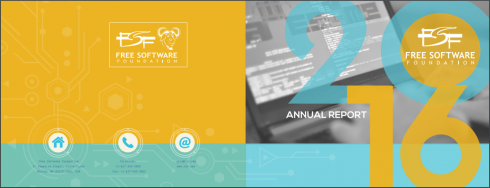
The Free Software Foundation’s future is looking bright according to its Fiscal Year 2016 Annual Report. The report outlines efforts and accomplishments by the free “as in freedom” software advocacy group over the previous year, from activism to awards and growth in membership and infrastructure.
With individual contributions to the non-profit totalling more than $1 million and additional funding from earned revenue, investments, interest and others, the organization was able to cleanly cover all operating expenses while setting over $56,000 aside, with a reported 81 percent of funds supporting the GNU project, free software and its other endeavors. An evaluation of the FSF’s financial health, accountability and transparency alongside over 8,000 other non-profits by Charity Navigator earned the FSF a top four-star rating.
“[Charity Navigator] chose us, out of 8,000 charities, for their all-purpose list of “10 Charities Worth Watching,” demonstrating significant progress toward making user freedom an issue of general, widespread importance,” foundation executive director John Sullivan wrote in the opening letter of the report. “These accolades reflect the hard work of our small, dedicated team, and show that supporters are right to invest their dollars and time in the FSF.”
Over last summer, the FSF and partners successfully lobbied European lawmakers for stronger laws in favor of net neutrality and mobilized community action against the U.S. Supreme Court’s approval of amendments to Rule 41 of the federal Rules of Criminal Procedure, halting expansion of the government’s authority to crack devices.
In addition, the organization’s Licensing and Compliance Lab, which defends copyright copyright claims on free software and publishes licenses like the GPL and offers Continuing Legal Education to legal and tech professionals and students, continued fighting against the Trans-Pacific Partnership alongside partners.
“We’ve worked with an inspiring number of organizations to fight for better policy when it comes to freedom on the Internet and protection from bulk surveillance, but we need more than good laws,” Sullivan wrote. “We need the software powering our world to be freedom-respecting by nature, from the ground up. This will only happen if a critical mass of people demands it.”
Furthering their efforts to codify what makes for free and ethical software practices, the foundation and collaborators drafted and launched ethical criteria for code-hosting repositories alongside evaluations of major sites based on those criteria.
In addition, the FSF attended 13 conferences over the 2016 FY, saw growth in email subscribers, unique website visits, launched a new version of its Email Self-Defense Guide and started taking donations to directly support the GNU toolchain.
“More people and businesses are using free software than ever before,” Sullivan wrote. “That’s big news, but our most important measure of success is support for the ideals. In that area, we have momentum on our side, but also much more to do.“






